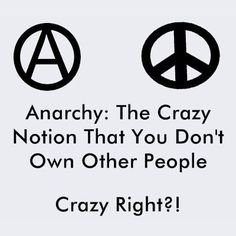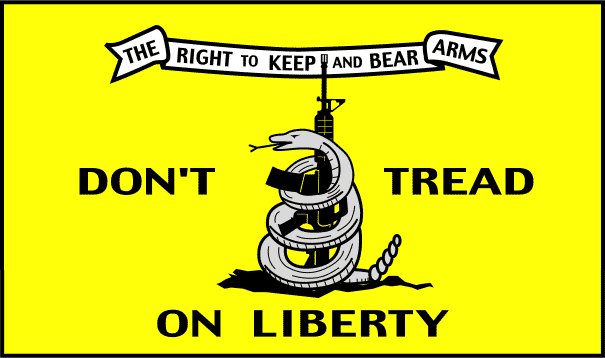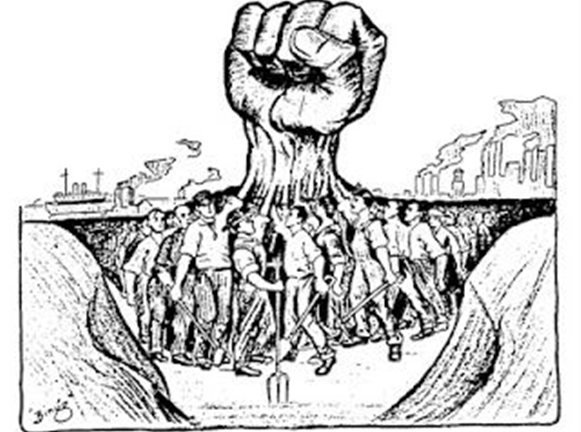An Introduction to Anarchism -- All you want to know about anarchism
Rebellion is a political rationality that is covered in misguided judgment. This is to a great extent because of the way that rebellion is a genuinely assorted state of mind, one which can't be portrayed by straightforward trademarks or partisan divisions. Indeed, on the off chance that you approach 10 rebels for their depiction of insurgency, you are prone to get 10 distinct answers. Insurgency is more than only a political logic; it is a lifestyle that incorporates political, businesslike and individual perspectives.
The fundamental principle of turmoil is that various leveled power - be it state, church, patriarchy or monetary tip top - is superfluous, as well as is intrinsically hindering to the amplification of human potential. Agitators for the most part trust that people are equipped for dealing with their own undertakings on the premise of inventiveness, participation, and shared admiration. It is trusted that force is inalienably adulterating, and that powers are unavoidably more worried with self-propagation and expanding their own particular force than they are with doing what is best for their constituents. Revolutionaries for the most part keep up that morals are an individual matter, and ought to be based upon sympathy toward others and the prosperity of society, as opposed to upon laws forced by a legitimate or religious power (counting respected laws, for example, the U.S. Constitution). Most rebel methods of insight hold that people are responsibile for their own particular conduct. Paternalistic powers encourage a dehumanized attitude in which individuals anticipate that elites will settle on choices for them and address their issues, as opposed to deduction and representing themselves. At the point when a power arrogates to itself the privilege to overrule the most crucial individual good choices, for example, what merits slaughtering or biting the dust for (as in military enrollment or fetus removal), human flexibility is tremendously decreased.
Revolutionaries recognize the association between different types of abuse - including sexism, bigotry, heterosexism, classism, and national haughtiness - and perceive the uselessness of centering restriction on one type of foul play while others keep on existing. Revolutionaries trust that the methods one uses to change the world must be as per the closures that one would like to accomplish. While agitators differ about methodologies and strategies, including the requirement for formal associations and the utilization of savage activity to topple existing fierce establishments, most concur that the center must not be on only decimating the present request, but rather on molding new, more others conscious and more normal contrasting options to have its spot.
Rebels in History
Rebels have had impact in progressive developments all through history. The French Revolution started in 1789 had a solid proto-rebel component. Rebels, for example, Pierre-Joseph Proudhon, Peter Kropotkin, Mikhail Bakunin, and Errico Malatesta had crucial influence in the advancement of progressive revolutionary hypothesis in the late nineteenth and mid twentieth hundreds of years. Revolutionaries assumed a significant part in the progressive developments in Russia in 1905 and 1917, however were smothered, regularly savagely, once the Bolsheviks had combined force. The Spanish Revolution of 1936-1939 set the phase for the most generally known extensive scale indication of rebel practice, in which anarcho-syndicalist associations (the FAI and CNT) effectively made workable, non-progressive social and financial options. In the United States, and in addition in Mexico and Latin America, there was an anarcho-syndicalist impact inside the exchange union development (for instance the Industrial Workers of the World). Noticeable agitators, for example, Emma Goldman and Alexander Berkman took part in an assortment of radical causes all through the mid 1900s. There was a solid rebel current in a considerable lot of the social change and option way of life developments of the 1960s (counting parts of the women's activist development, the gay freedom development and the counter war and free discourse developments), in spite of the fact that much of the time these were dominated, if not honestly stifled, by Marxist/Leninist/Maoist streams.
What Anarchism Is Not
With an end goal to elucidate what disorder is, it is helpful to analyze what political agitation is definitely not:
Socialism: While numerous agitators esteem communalism and cooperation, rebels dismiss the totalitarianism of the current and as of late fallen comrade, or all the more precisely Marxist-Leninist, states. The break amongst agitators and Marxists created as right on time as the 1870s as rebels saw that the Marxists were sustaining dictatorship under an alternate name. Marxist-Leninists bunches have customarily accentuated the requirement for a vanguard party and the tyranny of the working class, thoughts which are in a general sense restricted to the revolutionary spotlight on against dictatorship and most extreme individual opportunity. Albeit conventional Marxism predicts that the state will "shrink away" with time, we have over and over found in socialist administrations a combination of state force and its chaperon suppression and emphasis on similarity.
Libertarianism: Libertarians are frequently mistaken for revolutionaries and do, indeed, cover in numerous regards. Both offer an accentuation on individual flexibility and the longing to get rid of the state. Numerous libertarians dole out essential significance to the individual and underline the rule of edified self-interest. Numerous rebels tend to concentrate more on shared guide and endeavors to enhance the circumstances of all individuals from the group. Libertarianism is regularly portrayed by its financial perspective, which places greatest quality on unobstructed free market free enterprise (a few defenders call themselves "anarcho-business people"), approves the utilization of power in the resistance of private property, contradicts any administrative obstruction that hinders endeavors to expand individual financial pick up, and rebates values that can not be measured in financial (commonly fiscal) terms. While libertarians are hostile to state, they regularly are not contradicted to mastery and pecking order in every one of its structures (there is frequently a strain of "survival of the fittest" or "[economic] may makes right" in the libertarian logic), and don't try to profoundly modify societal force relations, particularly those taking into account monetary force. Revolutionaries have a tendency to have a more communist point of view, and support getting rid of any framework in which the well off can accomplish lopsided advantage while the less lucky endure undue hardship. While revolutionaries esteem singular activity, insight, and inventiveness, it is perceived that the individuals who have such abilities to a lesser degree ought to at present be approached with deference and equity. Objectivists are a radical kind of libertarian. The Libertarian Party is generally direct, and tends to concentrate on issues like discretionary change, annulling drug laws, and decreasing legislative control. Numerous libertarians are "minarchists" who trust that some type of government is fundamental however that it ought to be as negligible and inconspicuous as could reasonably be expected. The topic of what kind of financial framework would exist in a revolutionary society is an open one. A few rebels trust that all types of capital and the business sector economy must be abrogated, others support a framework that advances specialist proprietorship and full participatory vote based system inside a business sector economy, and still others trust that an assortment of monetary frameworks can coincide the length of they don't attempt to force their frameworks and qualities on each other.
"Progressivism": The predominant political ideas in this nation compare disorder with leftism, and leftism with radicalism, yet there are genuine contrasts, both quantitative and subjective. The possibility of "the left" is dangerous in the 1990s, since quite a bit of present day governmental issues tends to fall outside the customary left (liberal)/right (moderate) range. Albeit most agitators do bolster "dynamic" causes, insurgency does not by any means have a spot inside the customary political range. A few scholars have proposed a grid that takes a gander at level of financial dictatorship and level of social tyranny as two separate hub; frequently the individuals who support monetary freedom restrict social freedom and the other way around. A lot of advanced dynamic legislative issues depends on "personality governmental issues," the possibility that one's essential concerns and collusions ought to be made on the premise of race, sex and/or sexual introduction. Albeit numerous revolutionaries are vigorously put resources into character legislative issues, a more far reaching revolutionary reasoning anticipates a period when individuals won't have to concentrate such a great amount on such arrangements. While liberals tend to promoter endeavors to change the current framework (through such means as voting, campaigning, and sorted out illustrating), revolutionaries have a more radical view, and wish to supplant degenerate organizations altogether, and refashion a more sympathetic culture by method for direct activity, without dependence on any type of statist intercession. While agitators for the most part perceive the legitimacy of transformative and in addition progressive change, they recognize that so as to accomplish a genuine reordering of society it is important to destroy various leveled predominance relations wherever they exist; this has not generally been a need of liberals. Revolutionaries perceive that the structures of force themsleves (be they industrialist or comrade, "just" or totalitarian) are the base of the issue, and all things considered, can't be the premise for an answer. Albeit a few agitators participate in voting and sorted out challenge in the conviction that even little restricted upgrades are advantageous, they perceive that such exercises are simply interval steps, which one must go past with a specific end goal to accomplish genuine and enduring change.
Skepticism: as opposed to the "counter everything" philosophy of agnosticism, agitators don't advance irregular viciousness, decimation, and "each man for himself" wilderness (despite the fact that there are dependably a couple with this reasoning who call themselves "revolutionaries"). The normal recognition that political agitation is equal to tumult

Nice @simranverma
Shot you an Upvote :)
Upvoted